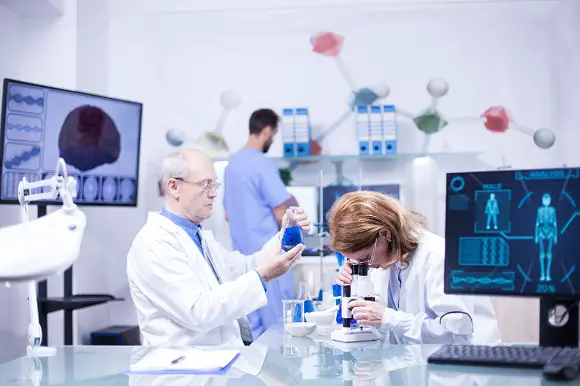Pharmacology is a branch of medical science that deals with a drug’s action and its fate in the body.
It has two broad divisions, pharmacokinetics and pharmacodynamics, but can be categorized into further sub-divisions.
Pharmacology describes the different classes of medicine available in the allopathic system (modern medicine), their mechanism, distribution, deterioration (metabolism), and excretion.
It is an essential subject as it helps a doctor know about a drug, its uses, its mechanisms in the body, and possible adverse effects of treatment.
The Branches of Pharmacology include
- Pharmacokinetics
- Pharmacodynamics
- Clinical Pharmacology
- Neuropharmacology
- Toxicology
- Chemotherapy
- Pharmacogenetics
- Pharmacoepidemiology
- Pharmacovigilance
- Molecular pharmacology
However, for ease of study and specialization, it has further sub-divisions like
- General pharmacology
- Cardiovascular pharmacology
- Gastrointestinal pharmacology
- Psychopharmacology
- Immunopharmacology
- Respiratory pharmacology
- Ocular pharmacology
- Dermatological Pharmacology
- Musculoskeletal pharmacology
- Clinical pharmacology
- Veterinary pharmacology
- Forensic pharmacology
Pharmacokinetics
- This is a division of pharmacology that describes the absorption, distribution, metabolism, and excretion of drugs in the body.
- It studies how the body’s physiology handles the drug inside the body and eliminates it safely to the outside.
- For any given drug, pharmacokinetic studies are essential for a safe therapy.
Based on it, factors like the number of doses, dosing schedules, and time of administration are determined.

Pharmacodynamics
- This is concerned with how drugs act in the body.
- Every drug molecule is studied extensively for its pharmacodynamics.
- It tries to explain the action of drugs on specific receptors, enzymes, or any other specific points in the body.
- It determines the onset of drug action, t1/2, therapeutic window, and duration of drug actions.
The overall changes brought in the body after administration are noted.
Toxicology
Any substance can act as a poison above the suitable doses. Toxicology is the study of the toxic properties of the drug.
It evaluates the toxic concentrations, the mechanisms of toxicity, the cells and organs involved in poisonous damage, the metabolism of toxins, and more.
It fixes the lethal dose 50% (LD50).
It also mentions the antidotes and methods for the treatment of toxicity.
Every new drug molecule undergoes toxicity research during the new drug development process.
Every new drug molecule undergoes rigorous toxicology tests during the new drug development process.
Chemotherapy
This branch of pharmacology deals with the use of chemicals to treat diseases.
It is mainly related to using chemicals to kill microbial parasites and abnormal cells (cancer cells) in the body.
This is of different types, like
- Chemotherapy of protozoans,
- helminth infections,
- tuberculosis,
- cancer.
Pharmacogenetics
This branch relates to the study of the effect of genetic changes on drug therapy across populations.
Pharmacotherapeutics
This is the study of the therapeutic uses of a drug and its effects on the disease condition.
It gives an idea of the symptoms, diagnosis, treatment of a disease, and possible side effects. It has more of a clinical component.
General pharmacology
This deals with the methods of drug absorption, distribution, metabolism, and excretion in detail.
It describes the role of different receptors in the body and their specific ligands.
It also explains how a drug can act in the body and its possible adverse effects.
Molecular pharmacology
As per NIH, this is the study of molecular actions and drug therapy interactions. It involves other sciences like molecular biology, biochemistry, and toxicology.
Neuropharmacology
This is the study of the drugs that act on the nervous system for various disorders and conditions like anesthesia, epilepsy, Alzheimer’s, parkinsonism, and amnesia.
Unlike others, the drugs acting on the nervous system have different pharmacokinetic profiles.
They tend to have higher lipophilic properties.
Cardiovascular pharmacology
This is the study of the drugs acting on the cardiovascular system.
This includes the drugs used for different heart conditions like angina, heart failure, arrhythmias, and myasthenia gravis.
It also includes the drug used for the management of hyper and hypotension.
Gastrointestinal pharmacology
Here, the drugs acting on the different conditions of the gut are studied, like those used for emesis, antiemesis, constipation, diarrhea, hypo chlorosis, acidity, gastric ulcer, fistula, and irritable bowel syndrome.
Psychopharmacology
As the name indicates, this covers the drugs used in psychiatric conditions like anxiety, depression, mania, bipolar disorder, schizophrenia, and addiction.
Immunopharmacology
Drugs used in immunomodulation and immune suppression are studied here.
Pulmonary pharmacology
This covers the drugs used to treat respiratory system disorders like cough, common cold, asthma, and chronic obstructive pulmonary disease.
Some of these drugs are used as aerosols to reach the lungs directly. For the systemic effect, they are also administered by oral and parenteral routes.
Ocular pharmacology
The eye is an organ that is anatomically isolated from the circulatory system.

Hence, the pharmacodynamic and pharmacokinetic parameters differ from the rest of the organs.
However, they are directly accessible for drug application.
The drugs used to treat eye disorders like glaucoma and other eye-related problems are studied.
Dermatological Pharmacology
The study involves the drugs used in different skin diseases.
Musculoskeletal pharmacology
The drugs used for the treatment of musculoskeletal disorders are studied.
Pharmacoeconomics
This is the study of the cost-effectiveness of drug therapy compared to other drugs.
It aims to provide optimal healthcare cost-effectively.
Clinical pharmacology
This deals with the implementation of knowledge of pharmacology in clinical practice.
Veterinary pharmacology
This is the pharmacology of drugs used for the treatment of animal disorders.
Animals have similar physiology to humans, but they require different doses based on their body mass and metabolic rates.
So, this veterinary pharmacology deals with the pharmacokinetics and pharmacodynamic properties of drugs in animals.
Forensic Pharmacology
This deals with links between drugs, toxicology, and pharmacology in solving legal issues.
It tries to identify the quantities of drugs and poisons responsible for pathology or death.
Frequently asked questions and answers.
Which area of pharmacology is also called clinical pharmacology
Pharmacotherapeutics is related to clinical pharmacology
What is pharmacological chemistry
Medicinal chemistry is related to pharmacological chemistry.